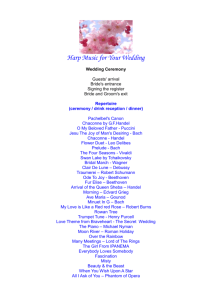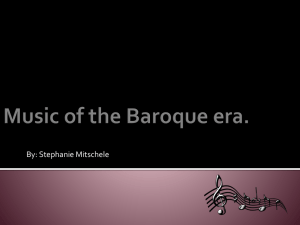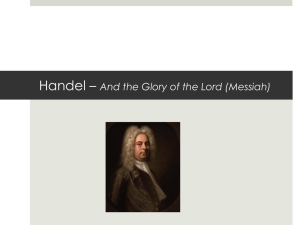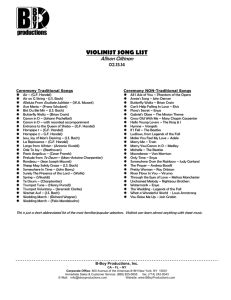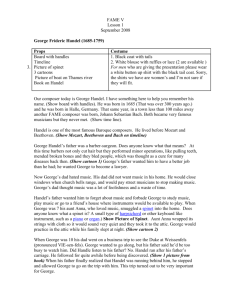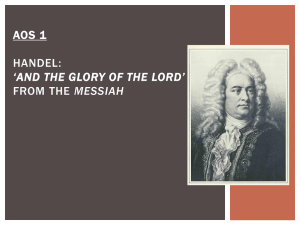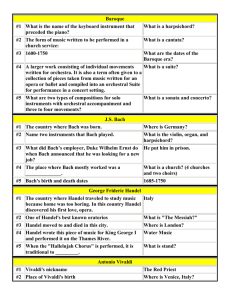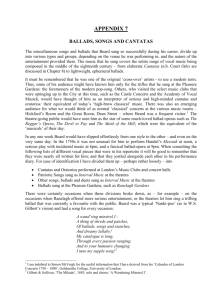Program Article by Ellen T. Harris
advertisement
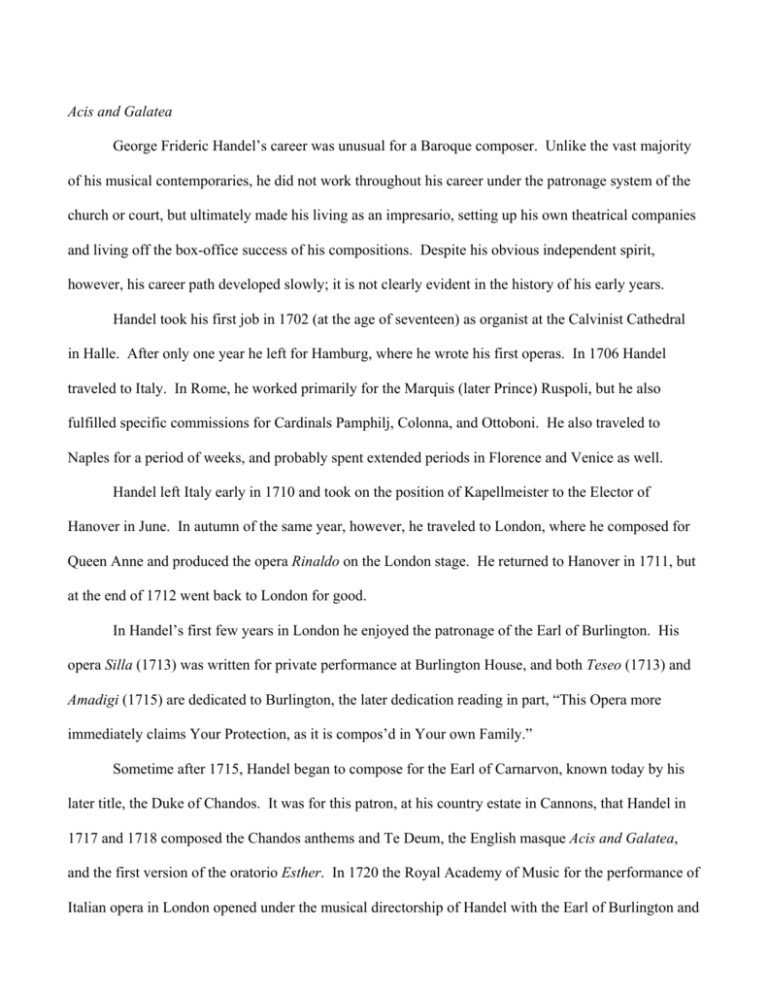
Acis and Galatea George Frideric Handel’s career was unusual for a Baroque composer. Unlike the vast majority of his musical contemporaries, he did not work throughout his career under the patronage system of the church or court, but ultimately made his living as an impresario, setting up his own theatrical companies and living off the box-office success of his compositions. Despite his obvious independent spirit, however, his career path developed slowly; it is not clearly evident in the history of his early years. Handel took his first job in 1702 (at the age of seventeen) as organist at the Calvinist Cathedral in Halle. After only one year he left for Hamburg, where he wrote his first operas. In 1706 Handel traveled to Italy. In Rome, he worked primarily for the Marquis (later Prince) Ruspoli, but he also fulfilled specific commissions for Cardinals Pamphilj, Colonna, and Ottoboni. He also traveled to Naples for a period of weeks, and probably spent extended periods in Florence and Venice as well. Handel left Italy early in 1710 and took on the position of Kapellmeister to the Elector of Hanover in June. In autumn of the same year, however, he traveled to London, where he composed for Queen Anne and produced the opera Rinaldo on the London stage. He returned to Hanover in 1711, but at the end of 1712 went back to London for good. In Handel’s first few years in London he enjoyed the patronage of the Earl of Burlington. His opera Silla (1713) was written for private performance at Burlington House, and both Teseo (1713) and Amadigi (1715) are dedicated to Burlington, the later dedication reading in part, “This Opera more immediately claims Your Protection, as it is compos’d in Your own Family.” Sometime after 1715, Handel began to compose for the Earl of Carnarvon, known today by his later title, the Duke of Chandos. It was for this patron, at his country estate in Cannons, that Handel in 1717 and 1718 composed the Chandos anthems and Te Deum, the English masque Acis and Galatea, and the first version of the oratorio Esther. In 1720 the Royal Academy of Music for the performance of Italian opera in London opened under the musical directorship of Handel with the Earl of Burlington and the Duke of Chandos as two of the original subscribers. Handel would never work directly under the patronage system again. At both Burlington House and Cannons, Handel was surrounded by the same group of literary figures, including Alexander Pope, John Gay, and John Hughes. After his first London visit, Handel had requested that Hughes send him an English poem. The resultant cantata, Venus and Adonis, is still thought to be Handel’s first setting of an English text. The text of Acis and Galatea (1718) derives from this literary group as well; it is principally by Gay but includes work of Pope and Hughes. Gay and Pope were founding members of a literary group calling itself the Scriblerus Club, which played a critical role in the raging debates of the 1710s concerning the proper criteria for pastoral poetry on the one hand, and the growing popularity of Italian opera on the other. Both controversies had an impact on the composition of Acis and Galatea. The Scriblerians argued against the realistic and rustic pastoral in favor of the classical and Arcadian poetry containing “a certain majesty in simplicity which is far above the quaintness of wit” (Pope). Gay parodied the rustic pastorals in The Shepherd’s Week (1714), writing in his introduction that “Thou wilt not find my Shepherdesses idly piping on oaten Reeds, but milking the Kine, tying up the Sheaves, or if the Hogs are astray driving them to their Styles.” But the Scriblerians could not win the argument by ridicule alone; Acis and Galatea was a joint effort to write a true, classical pastoral. The story, taken directly from Ovid’s Metamorphoses, is simple. Galatea, a water nymph, and Acis, a shepherd, are in love with one another. Polyphemus, a giant Cyclops, also loves Galatea, but she rejects his suit. In a jealous rage, he kills Acis. Galatea, encouraged by her friends, transforms Acis’s broken body into a “bubbling fountain.” Not only does its classical origin place this story clearly in the camp of the classical pastoralists, but the use of a text from Pope’s Pastorals of 1709 for the trio “The flocks shall leave the mountains” makes the authors’ battle position clear: it was specifically Pope’s Pastorals that had started the literary debate. In fact, Acis and Galatea can be understood allegorically to represent the pastoral “wars,” with Polyphemus symbolizing, to the Scriblerians, the hated rustic style, and Acis, the true Arcadian pastoral. With Polyphemus’s killing of Acis, Galatea (representing perhaps the Scriblerians themselves) is left to mourn, using her “power divine” to turn his body into a bubbling stream that will continue “murm’ring still his gentle love.” While the pastoral debate continued to rage, Italian opera was sweeping London. In opposition, many English writers and composers attempted to produce dramatic works in English. The most successful of these were the short dramatic entertainments called masques that were usually based on classical mythology, such as Colley Cibber’s Venus and Adonis and Myrtillo (both 1715), Barton Booth’s The Death of Dido (1716), John Hughes’ Apollo and Daphne (1716), and Lewis Theobald’s Decius and Paulina (1718). The Preface to Myrtillo makes its role in the controversy clear: The following entertainment is an attempt to give the town a little good music in a language they understand…It is…hoped, that this undertaking…may in time reconcile music to the English tongue. Of the masques mentioned above, one was set to music by John Galliard (Decius and Paulina); the others are all by John Pepusch, composer-in-residence at Cannons. Perhaps the Scriblerians recognized the superiority of Handel’s genius and hoped with his talent to win both the pastoral and opera wars. If so, the plan contained many ironies. Not only were all three of the composers engaged in this battle against foreign musical domination themselves transplanted Germans, but Handel, of course, had also become the leading operatic composer of London, was planning for the opening for the Royal Academy of Music, and could hardly have wished for the abandonment of Italian opera. However, Acis and Galatea ultimately was the work that propelled his career toward the composition of English dramatic oratorios, even though that did not occur until 1732, and then only in response to a pirated, public performance by another company. The musical forces in Acis perfectly suited the musical forces available in Cannons. Indeed the masque can be performed with as few as five singers—one soprano, three tenors (meaning countertenors and tenors), and one bass—and seven instrumentalists—two violins, two oboes (these players also covering the recorder parts, as was Handel’s typical practice), two cellos, and continuo. These instrumental and vocal numbers match those found in the eighth, ninth, and tenth Chandos Anthems, where soloists also sang the appropriate line in the choruses. If this was also the case in Acis, then the work was certainly not staged. Indeed in advertisements for the pirated performance of 1732, the performance is heralded as “being the first Time it was ever performed in a Theatrical Way.” Handel, however, set the story using the common forms of baroque opera, such as the da capo aria (which contains two distinct sections with the first repeated after the second), and molded these forms to his dramatic purpose. Through his setting, the music and text become a unified whole. Originally conceived in a single act, the masque can be divided into three sections. The first begins with a chorus in B-flat major, continues with five da capo arias and concludes with a duet in C major. The second section parallels the first. It begins with a chorus in B-flat major and continues with five da capo arias; it concludes with a trio in C minor. In the last section, Acis dies and the Arcadian atmosphere is shattered. Reflecting this disruption of normalcy, there are no da capo arias in the last section. The masque concludes, after the transformation of Acis, in the home key of B-flat major. Handel often borrowed music from his earlier compositions or from other composers, and the score of Acis provides examples of this. A few borrowings have been documented from Handel’s own works, and a handful of vague resemblances to the music of other composers has been suggested. The chorus “Mourn all ye Muses,” for example, seems to demonstrate Purcellian influence. As Winton Dean writes, “The broken unaccompanied cadences, false relations, and expressive play with words” are strongly reminiscent of the final chorus of Dido and Aeneas. Both choruses immediately follow the death of an important character. More remarkable is the borrowing documented by Handel scholar John Roberts in Polyphemus’s “Ruddier than the cherry” from Hamburg composer Reinhard Keiser. The tune is based virtually unchanged on a fragment of a bass line in an aria from Keiser’s Janus (1699). Handel’s stroke of genius, as Roberts argues, is the decision to present the Cyclops in an aria where an ungainly bass line becomes its principle melody; its wide leaps and incessantly repeated one-measure phrases make Polyphemus seem bumbling and inadequate. And Handel compounds the joke by writing a new accompaniment for flageolet recorder, the highest and smallest instrument of the orchestra. Nothing could better highlight the cyclops’s awkwardness and size than this extreme contrast in range and sound. In “The flocks shall leave the mountains,” Polyphemus’s destruction of the Arcadian atmosphere is indicated by his disruption of the da capo form, which never returns. It is impossible to know to what extent Handel took liberties with the text as it was presented to him, but it is clear that the text of the trio sung by Acis and Galatea could easily be set as a da capo duet. Polyphemus’s lines could then follow in an accompanied recitative. In contrast, however, Handel carefully sets up a duet texture, and then explodes it with the unanticipated entrance of Polyphemus in measure 17. Furthermore, he implies the use of the da capo form structurally (although not tonally), and it seems to the listener as if it is only the hurling of the boulder, so graphically depicted in the rushing strings at the end of the movement, that prevents the return of the first section of text. Handel enjoys toying with the listener’s expectations. In “Heart, the seat of soft delight,” Galatea transforms Acis into a fountain. In the first section she sings of her intentions. The actual transformation occurs in the second section with an abrupt change of style to the accompanied recitative. In the final section, there is no textual return, which would be dramatically impossible as the transformation has now taken place, but the musical motives symbolic of the flowing fountain return. With his play on the da capo form here, Handel gives musical expression to the idea that although Acis (the text) will not return, the fountain (the musical motive) will continue to tell of his love. Acis and Galatea was one of Handel’s most popular works in his lifetime. It was performed in many guises, the most heavily altered version produced by Handel in 1732 as a counter to the pirated performance in a competing theater. By 1739 Handel had reverted to a version much closer to the Cannons work, but he divided the masque into two acts and added a choral version of the duet “Happy we,” to give a firmer ending to the first act. Acis and Galatea stands at a critical juncture in Handel’s career. It represents the culmination of his years under the patronage system, and its composition therefore directly reflects the musical forces available to him at the musical establishment in Cannons. At the same time, it is his first dramatic work in English, a language he studied and learned with the help of the Scriblerians, and it contains the musical and textual seeds of the English oratorios that after 1742 completely supplanted Handel’s composition of opera. As one English librettist wrote in 1740 of the earlier attempts to create a satisfactory English substitute for Italian opera, “Whether it was owing to the Inability of the Composers, the Defects of the Performers, or the too prevailing Influence of the Italian Opera, those English Pieces had not the wish’d for Success, if we except Acis and Galatea, which in every Respect charms, to this Day, Persons of all Ranks and Capacities.” — Ellen T. Harris, Class of 1949 Professor at Massachusetts Institute of Technology This essay was originally published in 1985 in The Waverly Consort Program Guide, Volume 1 Number 2. It has been adapted by the author Ellen T. Harris for inclusion in this program for The Boston Early Music Festival’s 2009 production of Acis and Galatea and printed here with the permission of The Waverly Consort.

